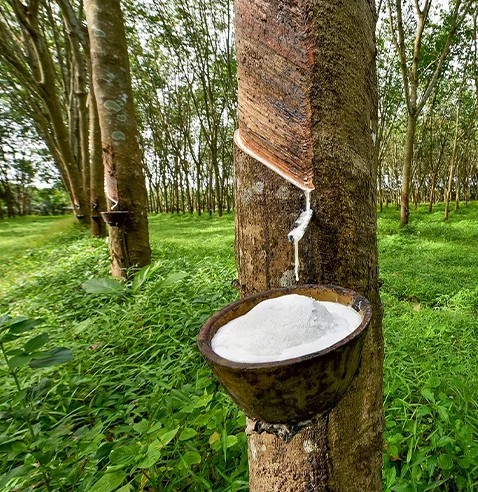Ghana loses an estimated $100 million annually through the export of raw rubber without value addition and the non-repatriation of foreign exchange, according to the Association of Natural Rubber Actors of Ghana (ANRAG).
The Association made this revelation during a presentation at the Ghana Industrial Summit and Exhibition held under the theme: “Unlocking Industrial Potential: Strategic Approaches for Ghana’s Economic Transformation.”
ANRAG has, therefore, called for a deliberate policy to restrict the export of raw rubber, stressing that such a move would stimulate investment in local processing facilities, create jobs and ensure greater value retention within the country.
The Association also urged strict enforcement of the Tree Crop Development Authority (TCDA) Act, 2019 (Act 1010) and specifically the export regulations in Legislative Instrument LI 2471, to curb the illegal export of raw rubber.
“With policy reforms in place, Ghana stands to attract both local and foreign investments in modern processing plants, technology transfer and related infrastructure,” ANRAG noted.
AGI Raises Alarm
In a related concern, the Association of Ghana Industries (AGI) echoed ANRAG’s sentiments, describing the current trend of raw rubber export as “unbridled” and detrimental to domestic rubber processors.
The Chief Executive Officer of AGI, Mr. Seth Twum Akwaboah, lamented that local industries are being denied access to critical raw materials due to unchecked exports.
“This is a blatant violation of the Tree Crop Development Authority Act and has the potential to undermine the entire rubber industry,” Mr. Akwaboah stated.
He disclosed that many rubber processing factories, which previously operated three production shifts daily, have now scaled down to a single shift due to raw material shortages.
“At this point, may I entreat our Honourable Ministers here present to kindly look into this and collaborate with the Tree Crop Authority to bring an immediate halt to the export of raw rubber,” he appealed.
Broader Concerns Shared by Stakeholders
The AGI’s concerns were echoed by the Rubber Processors Association of Ghana (RUPAG), which had earlier sounded the alarm over the same issue.
Recently, the Western Regional Minister, Joseph Nelson, also joined calls for a clampdown on raw rubber exports.
“It makes no sense that local processors lack raw materials, while the TCDA sits aloof and does nothing to stop the export of raw rubber,” the Minister said.
Impact of Currency Fluctuations and Import Surge
Mr. Akwaboah also touched on the broader challenges facing local manufacturers, noting that while the recent appreciation of the Ghana cedi has lowered foreign exchange costs for importers, it has exposed local producers to increased competition from cheaper, often unregulated parallel imports.
“These imports bypass regulatory checks or evade appropriate duties, giving them an unfair cost advantage over local manufacturers, who comply with tax and quality standards,” he explained.
He warned that without deliberate regulatory intervention, local industries risk losing their competitive edge — a development that could derail Ghana’s industrialisation agenda and broader economic transformation goals.
Policy Recommendations
The AGI has recommended several policy actions, including strict enforcement of import quality standards to prevent the influx of low-grade parallel imports;
Incentivising local manufacturing through favourable tariff and regulatory regimes;
Balancing electricity tariffs with investment in energy infrastructure to enhance reliability and industrial competitiveness.
“The time to act is now. Government must create a fair and predictable business environment to protect domestic industries,” Mr. Akwaboah concluded.









